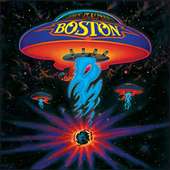I'd like to meet:
Click to join Boston Rocks !
Boston Rocks Yahoo Group:
http://launch.groups.yahoo.com/group/Boston_rocks
It was 1969. Tom Scholz was a recent graduate in Engineering from MIT. Unlike his fellow graduates who readied themselves for lifelong careers in engineering, Scholz decided to pursue his love of music. He joined as keyboardist for a local band (Mother's Milk) which was founded by guitarist Barry Goudreau. Other band members included singer Brad Delp and dummer Jim Masdea. Although Mother's Milk did not last, it laid the foundation for the band that would become known as "Boston". After the band’s breakup, Scholz began to create a series of tape recordings in his home studio in a suburb outside Boston.The first tapes failed to interest numerous record companies, but a second set of tapes, performed largely by Scholz on guitar, drew the attention of executives at Epic Records. It was only after the label insisted on seeing the band perform that bassist Fran Sheehan was added. Epic was not impressed with Masdea’s performance, which led to his replacement by Sib Hashian for the recording of Boston's first album in 1975 and 1976.Some debate remains about the circumstances surrounding the recording of the album, with Scholz claiming the album consisted (with the exception of "Let Me Take You Home Tonight") of his guitar work and Delp's vocals, and the new members (who were not actually officially signed to the label) played during the band's concert tour. Regardless, Boston became an immediate success and helped revive the popularity of mainstream rock at a time when punk and disco was becoming increasingly popular. Boston’s debut album ranks as one of the highest selling albums of all time, with more than 17 million copies sold. It was the top grossing debut album of its time.The band embarked on a worldwide tour to support the album, establishing Boston within a short time as one of rock's top acts. However, tensions began to develop between the band's label, which wanted a big follow-up album to capitalize on Boston, and Scholz, a perfectionist who did not want to be rushed in creating Boston’s albums.The result was Don't Look Back, released in 1978, two years after the debut album. At that time, this was considered a fairly long gap between albums, but Scholz still considered Don't Look Back to be a rush job and was not fully satisfied with the final album. It sold about half as well as the first album, which Scholz held Epic accountable for.Soon, another tour followed, and the album's title track was a hit. However, Scholz's relationship with both Epic and the other band members began to deteriorate. While Scholz began working on Boston's third album, Goudreau started work on his first solo album, which was also with Epic. Delp and Hashian appeared on the album, as did additional vocalist Fran Cosmo. They were each listed in the liner notes for the album, identified by their first names only. When Scholz saw a CBS album by Goudreau, with "Sib," "Brad," and "Fran" in the band, he suspected his label and Goudreau, of forming a "Boston in exile." Scholz made it clear he would not be working again with any of the band members besides Delp.A series of lawsuits followed, and slowed progress on completing the next album (which was now being recorded in much the same way the original tapes were: in Scholz's home studio, with Delp, Masdea, and former Sammy Hagar guitarist Gary Pihl). A tape of a song they had been working on, "Amanda," leaked out of the studio in 1984 and was widely bootlegged. However, the song did draw strong praise from the band's fans."Amanda" became the lead single six years later when Third Stage was released in 1986, after MCA Records bought out Boston's contract. Loosely built around the theme of life's "third stage" (the onset of middle age), the album was a big hit and was widely discussed in the press. Boston's subsequent tour sold out across the United States.In other endeavors, Scholz formed the audio-electronics firm Scholz Research & Development, Inc., which he later sold to market the highly-successful "Rockman" guitar amplifier. Also in 1988, Boston participated in local charity concert sponsored by Tea Party Concerts to benefit AIDS. This move was lauded by some local radio personalities, due to the stigma attached to AIDS that existed at that time. Despite this experience, Boston has continued to be involved in a number of charities, including anti-domestic-violence groups and local homeless programs.Eight years passed before the next album Walk On (1994) was released. It was the first album without Delp, because of his prior commitment to Goudreau's band RTZ. It also featured vocalist Fran Cosmo, who had performed on Goudreau's solo album. Unlike the previous albums, it sold poorly and did not produce any hit singles. The band also released a greatest hits album in 1997, which also contained some new songs.Another eight years passed before Corporate America (2002) was released. It featured Delp, Cosmo, and a new band membership which included drummer Jeff Neal, Fran Cosmo's son Anthony, and Kimberly Dahme. Dahme and Anthony Cosmo wrote and contributed new songs, including a country song by Dahme called "With You".As of 2006, a new Boston album is currently in the works and a subsequent tour is anticipated. Boston’s first two albums were remastered and re-released in Canada by Sony Legacy on April 7, 2006. Displeased with the quality of Sony’s remasters, Scholz personally remastered the albums which were re-released on June 13, 2006 (after the original Sony remasters were pulled from the shelves). Numerous magazines, newspapers and Boston fans hail Scholz’s remasters as “an incredible feat of sound engineering – Like listening to the albums again for the first time !â€
Music:
Books:
